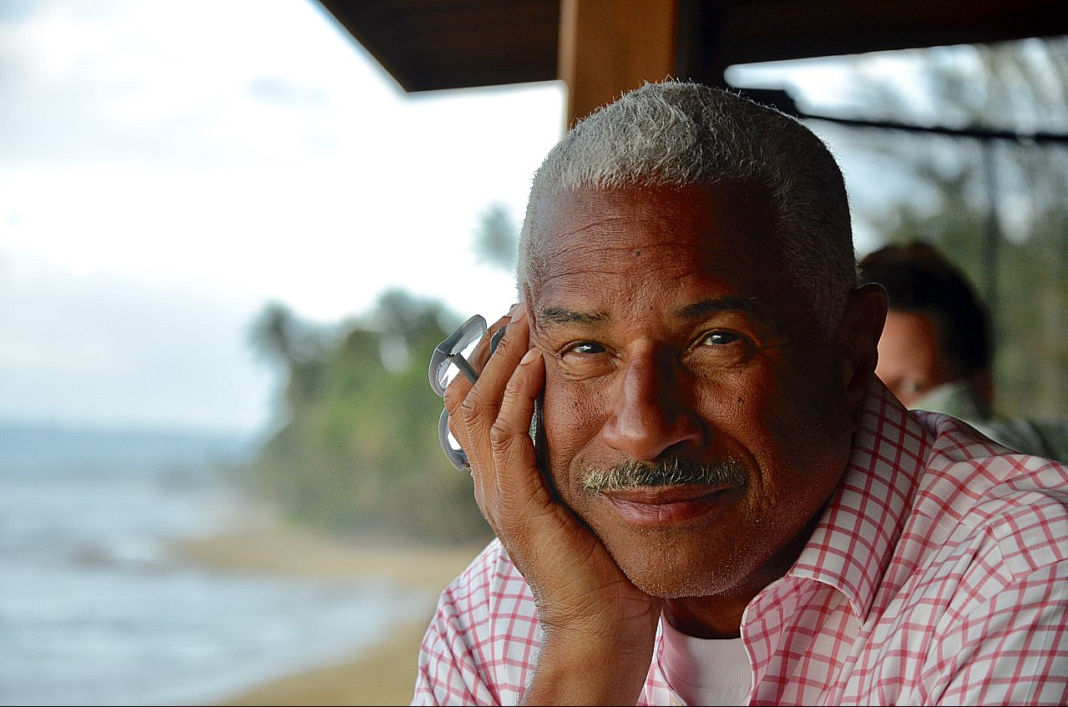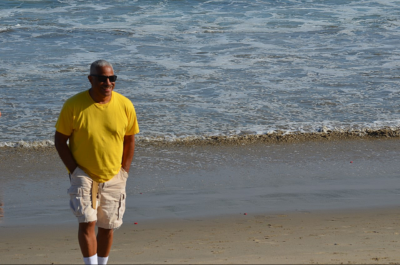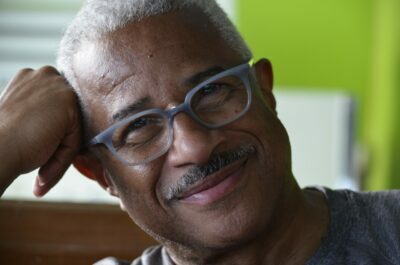Felipe Luciano has moved through life’s transitions with power and purpose. He has navigated his crusades for positive change with vision and unrivaled activism. Felipe is a 21st century Renaissance man with a noteworthy bio that seems endless–Emmy Award winner, former co-founder and chairman of the New York City branch of the Young Lords Party, journalist, radio and television personality, actor, spoken word poet, motivational speaker, historian, and revolutionary. When Felipe speaks, you tune-in! You are fueled by Felipe’s gestures, countenance, zeal, and inflection of his voice.
Felipe’s journey to now has been one of twists and turns. Born in New York City, he was raised in East Harlem and Brooklyn by a devout Pentecostal single mother. He credits his late grandmother, Margo, with instilling in him, cultural pride of his Afro-Latino ancestry. However, religion and strong familial ties did not prevent Felipe from engaging in gang activities at the young age of 13. By 16, he was sent to prison for attempted manslaughter and was sentenced to five years, of which he served two.
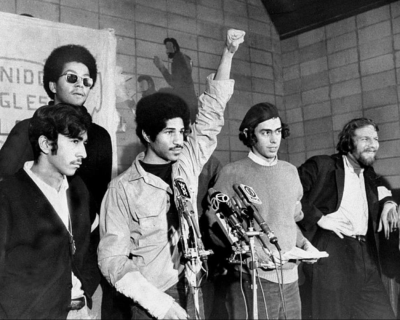
Upon his release, Felipe took his derailment to set a new path for himself. He enrolled at New York’s Queens College and immediately became a member of The Last Poets, the hip-hop forefathers who were known for their vitriolic Black power poems spoken over the beat of congo drums. He also became the co-founder/chairman of the civil and human rights organization, the Young Lords Party – the Puerto Rican counterpart to the Black Panther Party.
In 1972, Felipe founded and produced the acclaimed radio show Latin Roots, the first English-language program in the United States to feature Latin-centric cultural/political discussions and Afro-Cuban music. Over the years, the program had successfully gained an ethnically diverse audience, and this year, Felipe decided to shut off the mic to this particular show after an enviable run.
In the mid-70s, Felipe’s career path led him to television where he joined an NBC-TV New York City affiliate news program as a general reporter and later, a weekend anchor. Felipe became the first Puerto Rican news anchor of a major media network station in the United States. During his stint as a reporter, Felipe won an Emmy Award for Best Reporting and Story for a Live Special Report on prison life at the notorious New York City jail complex on Rikers Island. Adding to his already estimable achievements, Felipe also recently earned a master’s degree in Christianity and social justice from New York City’s Union Theological Seminary. He is a man who has torn down barriers and broken new ground throughout his life.
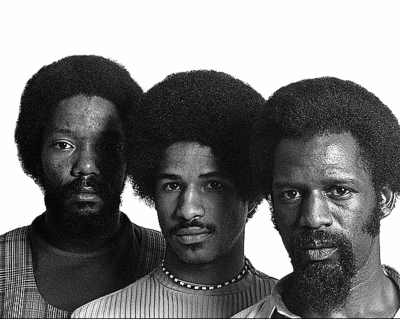
On a personal note, Felipe is the proud father of three adult children: Felipe, Ila, and Eric, and is currently engaged to be married. Felipe is also adding the finishing touches to his soon-to-be-released memoir, Flesh and Spirit: The Warrior Path, Confessions of a Young Lord. Felipe, who has never been one to sit on his hands, continues to lecture, consult on issues pertaining to emerging markets and is working on a podcast series.
The ever passionate, charismatic and still so guapo, Felipe Luciano, has indeed been and continues to be a game changer! Come eavesdrop on a recent and inspiring conversation between this Renaissance man and 50BOLD.
50BOLD: You are certainly the epitome of a Renaissance man, a true living legend!
Felipe: It’s funny you say that because I never knew I was one. I just know that I love what I do.
50BOLD: Do you have any regrets in your life or is there anything you would have done differently?
Felipe: The spiritual mind says that I am exactly where I am supposed to be. Everything that I’ve done got me to this point in time. I don’t beat myself up for the mistakes I’ve made because I have a purpose. This life is to be enjoyed.
It is important to love who you are. At 71 years-of-age, I am exactly where I should be. I feel it. I look it. I sound like it. I pray like it. I act like it. I’m happy about my children. I’m happy about my relationships. Whatever it is, I’m happy about it.
50BOLD: I read that you once said, one day we as a people will be running this country?
We were put here for a reason. I don’t believe God put us through all of this to have us end up insignificant. We already control the culture of the world. Everywhere you go, Black culture is out there. I don’t care if it’s dreadlocks, reggae, R&B, rap, whatever we do ends up becoming the culture of the world. What we have to do is believe it!
50BOLD: Absolutely!
Felipe: And monetize it! We need to control the music industry. We need to control our schools. We need to build banks. We have to start a new reconstruction. And not wait for Massa to tell us, “Ok, you can do this and you can do that!” No, we can do this! We still look for the majority culture to give us our validity. No! My validity lies in my beautiful Black Puerto Rican self.
We don’t understand the value of our being. Coltrane comes from us. Miles Davis comes from us. Bruno Mars comes from us. Tito Puente, Ray Barretto, Eddie Palmieri, Machito; they come from us and we don’t get it.
There is a museum in Phoenix, Arizona, called The Musical Instrument Museum. It is the most incredible building. It houses thousands upon thousands of musical instruments and other associated objects from places like Africa, Cuba, and Brazil. When I saw the stuff that came from Africa, I began to cry; the museum’s curator had to come out and hug me. I just broke down. I was asked, “Are you OK, Mr. Luciano?” I just broke down because I recognized the beauty of it all!
If we could just have a meeting of the movers and shakers of our culture to discuss how we are going to push for ourselves. Marcus Garvey tried it; he was way ahead of his time. Malcolm tried it; he was way ahead of his time. Martin tried it; he was way ahead of his time.
We are the heirs to the United States of America. We are going to run it!
What we need to do is get up and vote. If we visualize ourselves as warriors, as scholars, as sages, as builders, as entrepreneurs – we already have it in ourselves to get things going. We have to walk into our power!
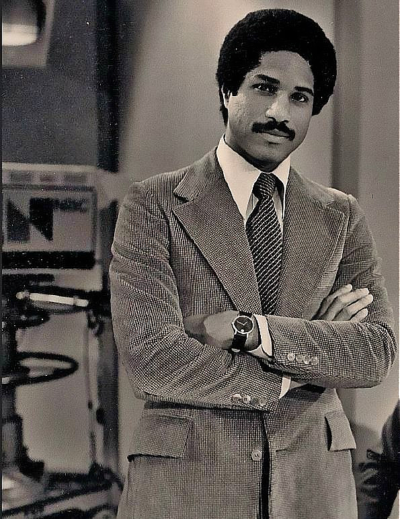
50BOLD: “Walk into our power,” I like that!
Felipe: We need to build families again. It took me years to understand this. I had to go back to my children whom I was estranged from for a while. I had to go back to their mothers and say, “I am sorry.” I was mad. I was crazy. The demon in us is not some little guy in a red suit with two horns and a trident. The demon is doubt, despair, and depression, these are demons.
50BOLD: I understand that your dad left the family when you were three-years-old. How did growing up without a father affect you as a man.
Felipe: What happens is that too many of us who are raised without fathers in the household are thrust into early adulthood. In my particular situation, I had my mother, the Pentecostal church, and gang members. My role model for manhood were gangbangers. They stood up and defended our community and I liked how they rolled.
I missed being a child; adulthood came quickly. I broke away from home. I wound up going to jail when I was 16. I went buck wild — gangs, screwing around, getting high, I got involved in all that stuff.
50BOLD: Felipe, I admire you as a Puerto Rican who has really embraced your African ancestry. It was your maternal grandmother who instilled that pride in you, right?
Felipe: Yes, my maternal grandmother, Margaret, we used to call her Margo, she instilled us with pride. She had nappy hair, and used to put a bandanna around her head. She would wear aprons even outside. One time I went to visit her in California and she gave me eggs and bacon that were so fresh because she used to raise chickens that I almost fainted when I ate the meal. She said, “You are used to city food, so by the time it gets to you, it is already old.”
As far as being Puerto Rican, most of us are Black. Around 1815, the Puerto Rican authorities which were mainly Spanish thought that there were so many Black people and Mulattos running around on the island they needed to import white people. They whitened up the race. When I see these Puerto Ricans who think they are white, I’m reminded of a song, “Where’s your grandma? Nappy, nappy, who is your papi?”
We know what the deal is. My grandmother used to tell me, “Be who you are. And walk like that.” I never, ever felt bad about being Black. I knew I was a pretty Nigga. My grandmother told me so. She meant the world to me.
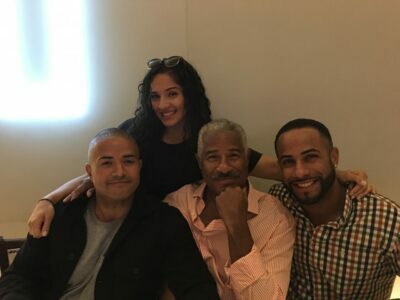
50BOLD: Felipe, you are the co-founder and chairman of the Young Lords Party which is celebrating its 50th anniversary this year since the founding of the New York chapter.
Felipe: It was the Young Lords Organization and then we broke away from Chicago and formed our own branch; we named it The Young Lords Party.
The Young Lords organization was started because (Jose) Cha Cha Jimenez was told by Fred Hampton of the Black Panthers, “Why are you continuing to fight us and fight your own people? This is crazy.” Fred Hampton would have been the next chairman of the Black Panther Party because of his smarts and charisma. He turned Cha Cha around who then began to move in the direction of social justice.
We went to see Cha Cha in Chicago, and he agreed to the charter. We then came to New York City and the rest is history. We instituted the first free breakfast program in New York City in every school. It took us 50 years, but we borrowed a page from the Black Panthers. Let’s be clear, the Black Panther Party started the free breakfast program. We took healthcare and made it an issue. We evolved into TB testing, lead paint testing, better treatment for Puerto Rican patients and help put in place the Patient’s Bill of Rights which is now standard in New York City hospitals. We fought for all of these changes.
50BOLD: Felipe what do we as Black people need to do to empower ourselves?
Felipe: There are three things we need to do: 1) We need to believe in an entity greater than ourselves and our ancestors. 2) We need to educate ourselves because reading is so important. This digital thing has us isolated. 3) We need to travel. If I could take every Black child and move them to different parts of America, you will understand that we are not just Black. This is ours. This is our damn land. We planted the cotton, we planted the corn, we planted the potatoes. We did it all! The dollars that this nation has accumulated comes from Black labor. If it had not been for cotton, this country would be dead. Let’s be honest.
50BOLD: You are in good shape. How do you take care of yourself? Do you work out?
Felipe: I worked out so hard, I had to go the hospital for a back muscle strain. I’m 71, I have to cool my game. I tried to do some lifting, you know, trying to compete with these young boys. I was lifting two plates on either side, and these boys were saying, “Oh, old man, you are alright?” Man, then I had to slather Ben Gay on my ass.
50BOLD: Well, the strain was worth it because your hard work shows.
Felipe: I try to stay in shape but now it’s going to take two months for me to get rid of this back strain. I have to take it easy.
50BOLD: Felipe, why did you decide to get a master’s degree in Christianity and social justice at Union Theological Seminary?
Felipe: I felt empty inside.
50BOLD: Really…
Felipe: Yeah. I had done all of these things that you had mentioned; all this Renaissance stuff, I had won Emmys. I had won all kinds of radio awards. I worked with the legendary radio personality, Frankie Crocker who was at WBLS-FM. I was close to H. Rap Brown (Jamil Abdullah Al-Amin) and Stokely Carmichael (Kwame Ture), Minister Louis Farrakhan, Amiri Baraka, Cornell West. I was at the forefront of every major Black and Puerto Rican movement.
I was a member of The Last Poets. But something was missing inside of me. I realized that even though I was thoroughly against the church — there is a difference between church and God.
I was truly missing something; my soul felt empty.
50BOLD: Spiritually?
Felipe: I knew I had to find a way to get back to spirituality. In these (theological) schools, they deconstruct your spirituality. They almost work against the church.
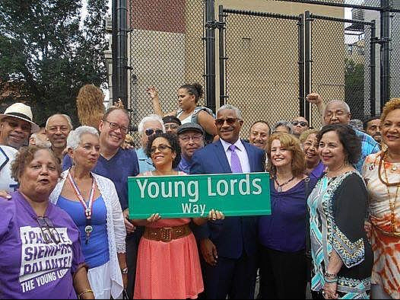
50BOLD: Is that so?
Felipe: Oh yes! So I went to the most liberal grad school, Union Theological Seminary. Girl, I had to fight every day!
50BOLD: What do you mean by fight?
Felipe: I had to fight because my belief in an almighty is personal. It’s not institutional. It does not come from me going to church. It is personal. I had guns pointed at me. Bullets have missed me. I don’t have scars on my face. God had a plan for me.
I didn’t get it. So I went to Union and learned the essence of old parables. I learned who Jesus was; the historical Jesus was a bad Black man.
50BOLD: Do you believe there was a real Jesus?
Felipe: Oh yes there was a real Jesus, there is no doubt about it. Even the Greek philosophers knew there was a Black Jesus. You see, we continue to think of Jesus as some mystical figure who said, “Please, don’t fight.” Bullshit! Jesus believed you’ve got to stand up and fight the power. Just like Public Enemy said, “FIGHT THE POWER!”
People think Jesus was some punk going around turning water into wine. Bullshit! He was serious about revolution. He was a soldier! How is it that Black preachers are not teaching this to their church members?
50BOLD: You have spoken out against the Trump Administration’s immigration policy involving the caging of children. Can you please elaborate on your stance?
Felipe: I’m watching Black people and Latinos sit here acting like nothing is happening. What the hell is wrong with ya’ll? Don’t you see these children could be yours? Don’t think that just because the talk is about illegal immigration, it can’t touch you. Puerto Ricans were made U.S. citizens in 1917; this can change tomorrow. We had better begin to understand that these children, are our children.
50BOLD: Felipe you’ve done radio shows like Latin Roots. Music can be so energizing and uplifting. Why do you consider music so important in our lives?
Felipe: Music is spiritual food. James Weldon Johnson, Lift Every Voice and Sing; Donny Hathaway, Someday We’ll All Be Free; I still get tears in my eyes when I hear these songs. John Coltrane, My Favorite Things. Nancy Wilson, Guess Who I Saw Today?
50BOLD: Oh, yes!
Felipe: Nancy will knock you out!
50BOLD: (laughs) Oh, my God!
Felipe: Nina Simone, Four Women. You play that stuff; it leads you to transformation. The Haitian revolution was led by music and drum. They heard those drums and they beat those French boys silly. They (the French) still can’t stand them because they lost.
But here’s what bothers me. Black people, here in the United States have ostracized Haiti. How can you say Haiti has nothing to do with you? Haiti revolutionized South America. Haitian agents went all over South America and said you have to revolt. The liberation of South America occurred because Haitian agents said, “It’s time! We did it, you can do it!”
We had laws on the books that said if they find Haitians in Puerto Rico, kill them, hang them, or give them to us; the Spaniards knew of this. Jefferson was so afraid after the Haitian Revolution that he cautioned how we have got to be careful. Because if the Haitians did it, slaves here may do it too. When you think about what Haiti is to us, girl, please!
50BOLD: Just a few more questions, I know your homeland Puerto Rico experienced the horrific Hurricane Maria and the island was in huge debt before and now Puerto Rico is still in debt…
Felipe: $74 billion-plus!
50BOLD: And there was that entire Puerto Rican governorship debacle. What’s going to turn Puerto Rico around so that they can come into their own again?
Felipe: There is only one answer. Independence. Puerto Ricans are so colonized it terrifies them to be independent. A lot of us want independence, but they are terrified of it.
How are we going to work without Massa? How are we going to live without Massa? Puerto Rico is like a battered woman. A battered woman who every time you go to her aid and tell her she has to leave this man, she says, “But, how will I live?”
Man, stop! We can’t get rid of the disease of addiction to the U.S.! Independence is the answer! I’m happy that they got their corrupt governor out. They got all of the others out. But the lady (Wanda Vázquez Garced) that they just put in, you better watch her. She’s a part of that whole cabal.
Frantz Fanon in the book The Wretched of the Earth said that sometimes the first people you have to get rid of are the native bourgeoisie. All they want to do is make the money. The native bourgeoisie are always the ones who tow the white man’s line and follow his lifestyle.
50BOLD: How do you want to be remembered?
Felipe: As a scholar, a poet, a writer, and as a warrior for his people.


